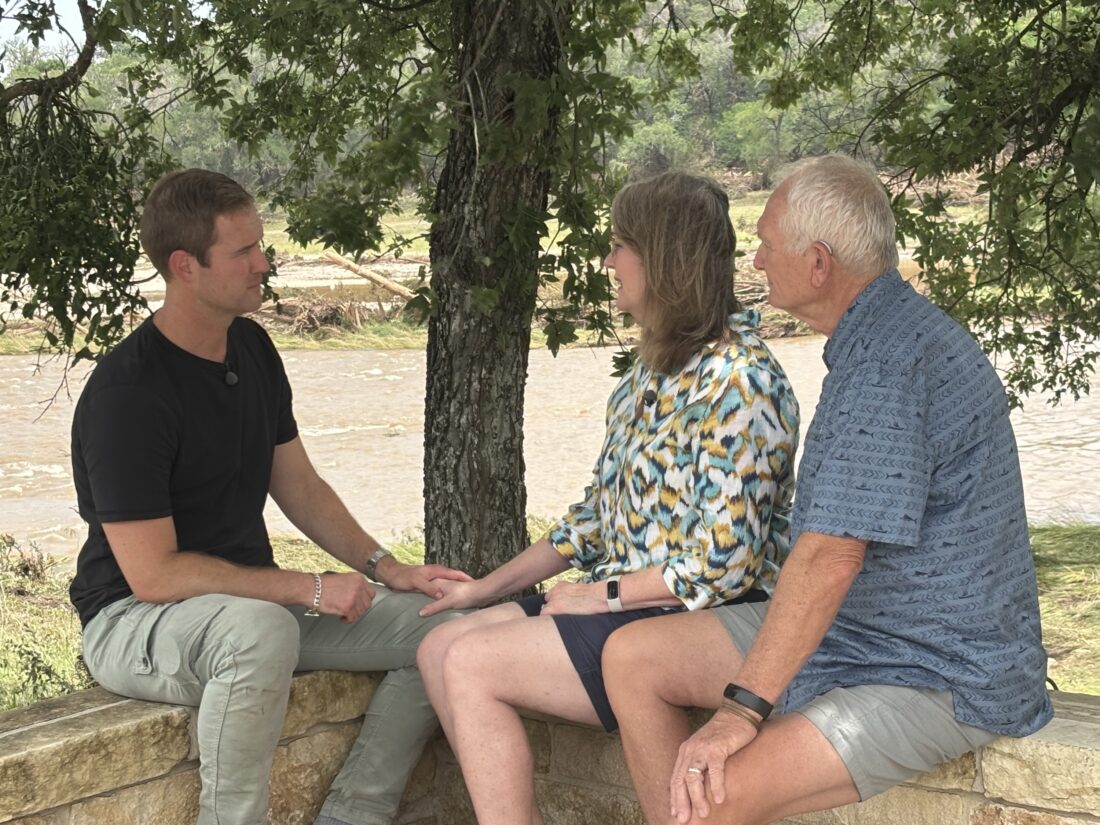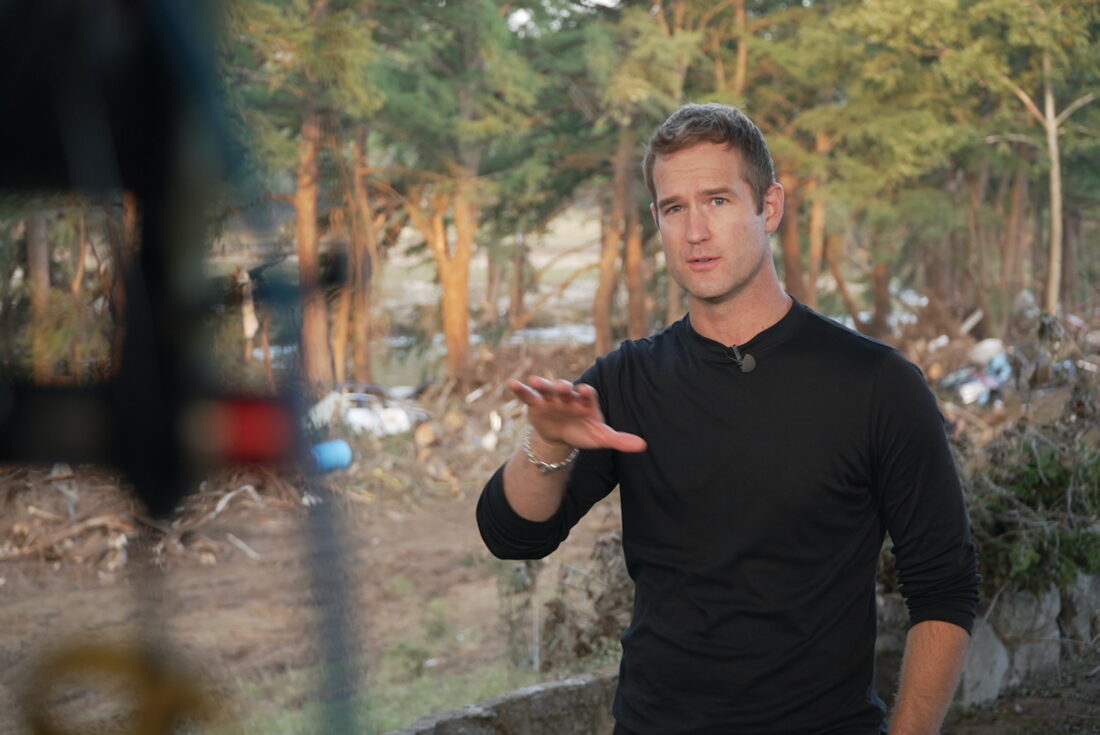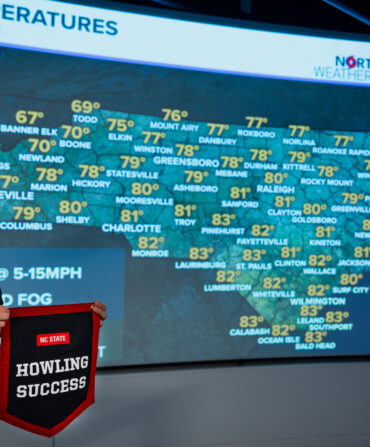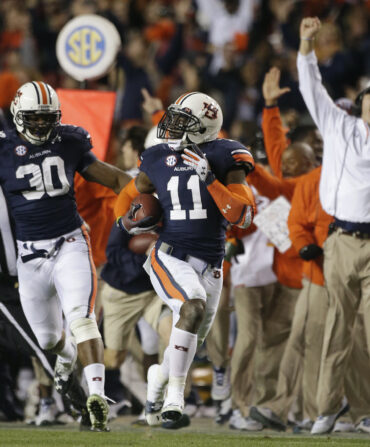NBC Nightly News national correspondent Morgan Chesky woke up early on July Fourth to a series of puzzling texts inquiring if his family and hometown of Kerrville, Texas, were okay. “It took me about two minutes to catch up, and the rest of the day was a blur,” he says. The Kerrville area, two hours west of Austin, had taken the brunt of an overnight flash flood that drove the winding Guadalupe River far beyond its banks and raged through a series of recreation areas and historic summer camps with tragic results. (As this story was written, the death toll was above 100 and sure to rise higher as crews access tangled debris.) Chesky was soon reporting from back home, on TV and as a host of the recently debuted NBC News podcast Here’s the Scoop. We grabbed him just long enough to learn some details about the unusually personal assignment.
Growing up in Kerrville, what was your experience of the Guadalupe River?
The Guadalupe is considered a jewel of the Hill Country, a green ribbon that runs through the hills here. As a kid, you don’t realize how blessed you are to have it nearby. In the summer you’d mow a few lawns and then see where your buddies were and head to a swimming hole or rope swing on the Guadalupe. In middle school, a friend and I put a canoe in upriver and floated to Kerrville with a cassette player blasting classic rock.
Were there floods back then?
If you grow up in South Florida, you’re aware of hurricanes. If you grow up in Texas Hill Country, you’re aware of flash floods and what they are capable of doing. Every few years there would be a flood, and we’d go to the water’s edge and watch the torrent. We understand the sheer power and danger it can bring. And yet no one in my lifetime or my mother’s lifetime has witnessed anything like this. There was a flood in 1987 that everyone considered “the big one”—until this one rewrote the rules.
It seems like this flood unfolded at the worst possible time.
There are two words I keep hearing. People here are calling it the “perfect storm.” That sounds clichéd until you know that there were eleven inches of rain over the headwaters of the Gaudalupe in a short period of time, overnight, and downstream these summer camps and RV parks were packed at the onset of a holiday weekend. All these elements combined to create this absolute nightmare. Anything touching the river got walloped. Many people had converged on Kerrville for the holiday in tents and RVs, so we don’t even know exactly how many people are missing. A friend of mine is on a search team digging bodies out of the mud.

Your own mother and stepdad live on the river, right?
Yes—my mom woke up to a weather alert at 4:00 a.m. The river was barely out of its banks, so she came back inside and almost immediately started hearing a roar, and a half hour later the river was up thirty feet and about to cross the street and approach the house. That’s when my stepdad ran to a nearby area of RVs parked even closer to the river and started banging on doors. One gentleman who thought he didn’t need to drive off had his trailer washed away minutes later. When my stepdad got back to the house, the water was up to his knees, and that’s when they hopped in the car and got out of Dodge. When they were able to return and see the aftermath, the house had survived. But not far away he spotted the body of a young girl that had caught in the branches of a tree. The only way she was identified was the bracelet she was wearing. He said that sight will haunt him forever.

The deaths of children at Camp Mystic and elsewhere are heartbreaking.
Tragedy involving children always hits deeper. But I could have never anticipated the emotion I’d feel until I became a father myself. When I was on the phone with my mother and she told me that the Mystic girls were missing, I broke down for the first time. My own two-year-old daughter was sleeping in the next room, and I couldn’t imagine what those parents were feeling.
You’ve reported on natural disasters before. Does covering such devastation in a place you know so well underscore that the story will continue after the reporters go away?
You’d think my experience would better prepare me, but to be clear, this is home. Seeing everything here is like covering a tragedy for the first time. I know from this job that the recovery continues well after the cameras leave. For the first time, though, I will be emotionally invested to know that a place gets back on its feet. My family knows how lucky we are at this moment, and we also know people here who are dealing with the unimaginable. But amid the collected grief, I can feel the grit of this town I grew up in, and that’s heartening.








